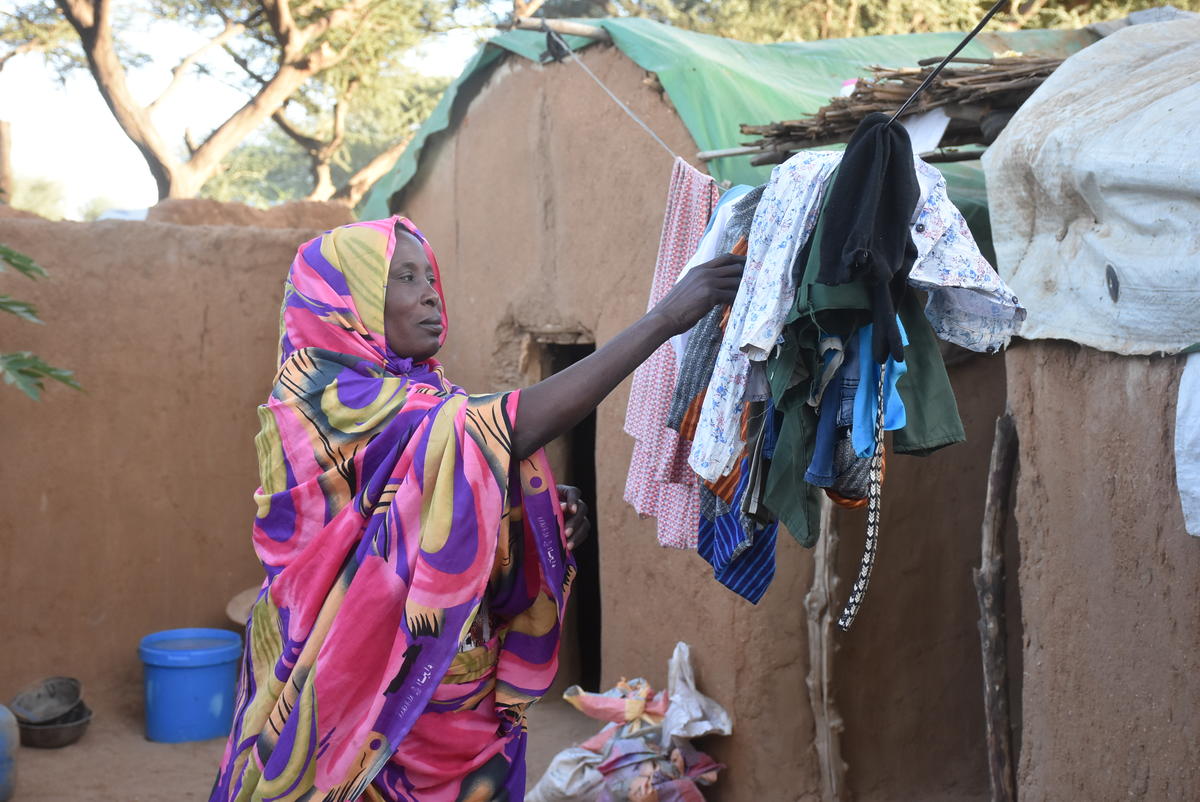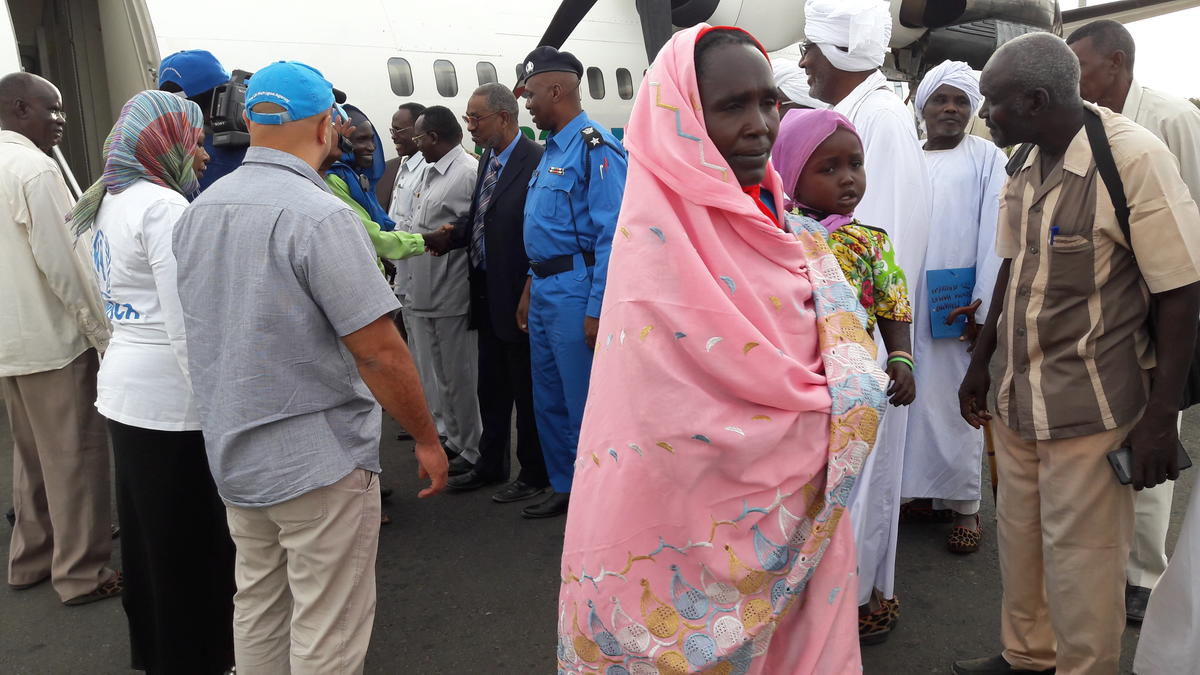Displaced Sudanese pays the price for believing her Darfur village is safe
Displaced Sudanese pays the price for believing her Darfur village is safe

EL GENEINA, Sudan, Aug. 18 (UNHCR) - Perching gingerly on the edge of a hospital bed, the shockingly thin middle-aged Sudanese woman stoically resists any murmur of pain as she calmly explains how she ended up with four bullet wounds in her body - the reward for believing assurances that it was safe to go home to her village.
"They came at night and shot my son and killed him and shot me also," Asha says simply, relating her view of the latest instalment in the violence that has convulsed the Darfur region of Sudan for the last 18 months and driven more than 1.2 million people - half its population - from their homes.
Asha and her fellow villagers first fled Beer Dageeg, 37 km north of West Darfur's capital, El Geneina, several months ago when it was attacked by the Janjaweed militia who have terrorized Darfur's indigenous black Africans. Asha and her fellow villagers took refuge in a miserable makeshift camp in Kondobei, 30 km north of El Geneina, for about two months.
Then about four weeks ago, the villagers in Kondobei were assured that it was safe to return to Beer Dageeg.
Mastura, a neighbour who brought Asha to Geneina Royal Hospital, takes up the story. "Someone from the government - I don't know who - came and told us we could go home." There was pressure, she said, "but they didn't do it by force. They said, 'it is safe now. We are around the village everywhere, no one can attack you'."
In a society where women have little say, the men of Beer Dageeg decided to go home and the women had no choice but to follow. "We wanted to see our houses again," Mastura explains.
The entire village - perhaps 50 households - spent a whole day trekking back to Beer Dageeg on donkey-back, but found out the reality was quite different from the promises. Not only were there no policemen protecting the village, but the Janjaweed had moved into their homes, stolen their livestock and were now farming their land. "We were told we could live with them, but the Janjaweed would treat us like second-class citizens," says Asha, who had already been a widow for many years. "They told us we had to ask their permission to do anything in our own village."
They spent just 15 days in the village. Then on the night of Aug. 6, armed men started firing their G-3 assault rifles at the recent returnees.
Asha's only child, a young man of about 19 or 20, was killed. Sitting on a filthy yellowed sheet on her hospital bed, she pulls up the hem of her blue robe to display bullet wounds in both thighs, and another wound in her right side. The fourth bullet just grazed the tip of a finger on her right hand.
That night, seeing Asha was injured, Mastura jumped into action and commandeered a rare car to drive the one and a half hours to hospital. Neighbours stopped just long enough to bury Asha's son, and then the whole village took flight once again.
"The people who shot me, they were my neighbours and I knew them," Asha says in a voice devoid of emotion. Four other villagers were killed in the same attack, she says. "Until now, I don't know what happened to my relatives."
Neither Asha nor Mastura will take a chance on going home again, preferring to join the hundreds of thousands of people in the miserable settlements called camps in Darfur, which are not run by UNHCR.
The attack came at a time when Sudan is under pressure from the UN Security Council to rein in the Janjaweed or face unspecified measures. It also comes amid concern expressed by the UN refugee agency about pressure being exerted on displaced people to go back to their villages. UNHCR is assisting some 180,000 Sudanese refugees who have fled into Chad and is also attempting to protect displaced people in a highly unsafe part of Darfur.
"The international community is facing a dilemma in finding alternatives for the future," says Jean-Marie Fakhouri, UNHCR's newly appointed director of operations for Sudan and Chad. "If Darfur's refugees and displaced people stay in camps for years, it will be a serious failure for the whole international community. Restoring security should be the priority for everyone."
However, UNHCR insists "any movement of displaced people must be entirely voluntary," says Eusebe Hounsokou, head of UNHCR's team in Darfur, an area the size of France in western Sudan.
"UNHCR has repeatedly stressed that people who have already been traumatized by being driven from their homes by armed men must not be subjected to another forced relocation," he adds. "We are concerned that villages are not safe for people to return to. And even if displaced people did return, they would have no way to feed themselves since their animals have been stolen and their crops have been destroyed."
Protecting displaced people is a daunting task in a part of the country where a UN map shows only three types of territory - insecure areas, very insecure areas and extremely insecure areas.
"In fact, there is evidence that attacks on civilians are still occurring," said Hounsokou.
In Asha's hospital ward lie two women from another village north of El Geneina. Neighbours in hospital as they were in their village, they are both nursing gunshot wounds to their feet.
The women refused to flee when the Janjaweed first attacked their village of Um Kiki last year. But then on the night of Aug. 5 they came a second time. "They attacked us in our houses while we were sleeping," says a 30-year-old mother of four.
Will they go back to their village now? From their beds, both women utter an emphatic "No," waving their hands in disgust. "I don't know where I will live when I leave this hospital, but I know for sure we can't go back to our village. They will kill us" says the 30-year-old.
Even in the capital, El Geneina, residents report having been attacked. In the hospital bed next to Asha's is Nefisa, a 40-year-old mother of four, sitting ramrod straight to avoid disturbing the bullet wound in her chest. She said she was shot one recent Saturday evening during the rainy season (Aug. 7) in the section of town called Kurti.
"When the rain stopped, I sat down to make a fire to cook something for my family, and someone shot me. I didn't see who and I don't know why they would want to shoot me."
Bucking the trend among displaced people, she is eager to go back home as soon as she's released from hospital. "I want to go back to farming my land," she says. "This is the only work I know. I have to farm my land to survive."
But she's not putting her faith in the police to protect her. "God will look after me. God doesn't make me fear."
By Kitty McKinsey in El Geneina, Sudan








